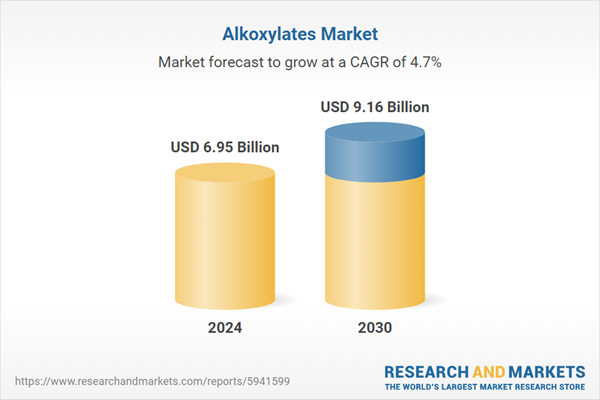Fatty Acid Ethoxylates is the fastest growing segment, Asia-Pacific is the largest regional market
Speak directly to the analyst to clarify any post sales queries you may have.
10% Free customizationThis report comes with 10% free customization, enabling you to add data that meets your specific business needs.
Key Market Drivers
The escalating emphasis on environmental sustainability and stringent global regulatory frameworks are significantly propelling the demand for biodegradable and eco-friendly alkoxylates. Consumers increasingly favor products with reduced environmental footprints, driving manufacturers to innovate and adopt greener chemistries. This shift is evident in the development of bio-based surfactants, which align with circular economy principles.The industry is responding with considerable investment in expanding production capabilities for these sustainable alternatives. For instance, according to Evonik, in April 2023, it announced an expansion of its capacities for renewable-based biosurfactants in Slovakia by more than 40% [cite: Evonik, April 2023, "Evonik boosts capacities for renewable-based surfactants"], underscoring the market’s robust drive towards environmentally benign solutions. This trend influences formulators across various sectors, necessitating the integration of sustainable alkoxylate solutions.
Key Market Challenges
The global alkoxylates market faces a significant impediment to growth stemming from the volatility of raw material costs, a challenge profoundly intensified by ongoing geopolitical factors and trade barriers. The unpredictable fluctuations in prices for key feedstocks, such as ethylene and propylene derivatives, introduce substantial uncertainty into the production economics for alkoxylate manufacturers. This instability complicates strategic planning and pricing strategies, making it difficult for producers to maintain consistent profit margins and competitive market positions.Key Market Trends
Advancements in alkoxylation process technologies represent a pivotal trend in the global alkoxylates market, driving efficiency and optimizing production. This involves innovations in catalysts, reactor design, and process controls aimed at enhancing selectivity, reducing energy consumption, and improving product purity. Such technological progress allows manufacturers to produce alkoxylates more sustainably and cost-effectively, meeting stringent environmental standards and economic pressures. For instance, Stepan Co. officially began production at its new alkoxylation plant in Pasadena, Texas, in early April 2025, a facility boasting an annual production capacity of 75,000 metric tons of alkoxylates for diverse industrial applications.Key Market Players Profiled:
- Clariant International Ltd
- Croda International Plc
- IMCD N.V.
- The Dow Chemical Company
- Indorama Ventures Public Company Limited
- Lamberti S.p.A.
- PCC Rolls Company
- Schärer and Schläpfer AG
- Solvay SA
- Stepan Company
Report Scope:
In this report, the Global Alkoxylates Market has been segmented into the following categories:By Type:
- Fatty Acid Ethoxylates
- Alkyl Phenol Ethoxylates
- Glycerin Alkoxylates
- Sorbitan Ester Alkoxylates
- Others
By End User:
- Agrochemicals
- Paints and Coatings
- Personal Care
- Pharmaceuticals
- Oil and Gas
- Others
By Region:
- North America
- Europe
- Asia-Pacific
- South America
- Middle East & Africa
Competitive Landscape
Company Profiles: Detailed analysis of the major companies present in the Global Alkoxylates Market.Available Customizations:
With the given market data, the publisher offers customizations according to a company's specific needs. The following customization options are available for the report.Company Information
- Detailed analysis and profiling of additional market players (up to five).
This product will be delivered within 1-3 business days.
Table of Contents
Companies Mentioned
The companies profiled in this Alkoxylates market report include:- Clariant International Ltd
- Croda International Plc
- IMCD N.V.
- The Dow Chemical Company
- Indorama Ventures Public Company Limited
- Lamberti S.p.A.
- PCC Rolls Company
- Schärer and Schläpfer AG
- Solvay SA
- Stepan Company
Table Information
| Report Attribute | Details |
|---|---|
| No. of Pages | 185 |
| Published | November 2025 |
| Forecast Period | 2024 - 2030 |
| Estimated Market Value ( USD | $ 6.95 Billion |
| Forecasted Market Value ( USD | $ 9.16 Billion |
| Compound Annual Growth Rate | 4.7% |
| Regions Covered | Global |
| No. of Companies Mentioned | 11 |









